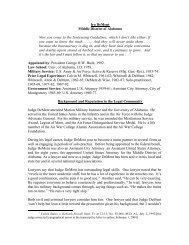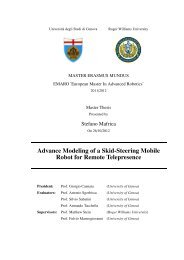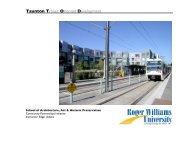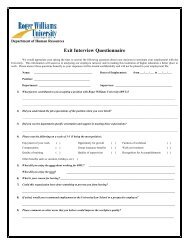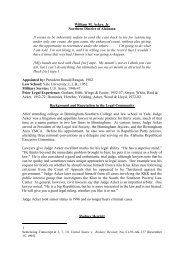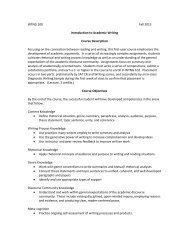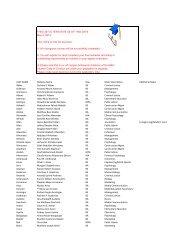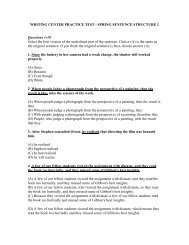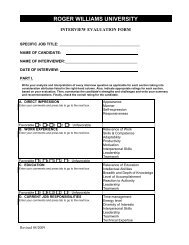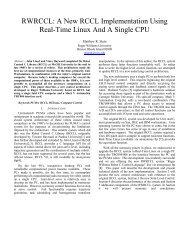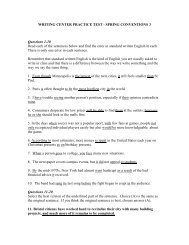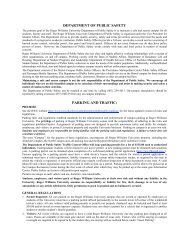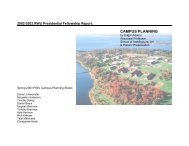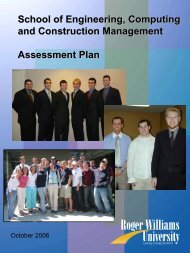Architecture Program Report Master of Architecture - Roger Williams ...
Architecture Program Report Master of Architecture - Roger Williams ...
Architecture Program Report Master of Architecture - Roger Williams ...
Create successful ePaper yourself
Turn your PDF publications into a flip-book with our unique Google optimized e-Paper software.
Workload Expectations<br />
We believe that one <strong>of</strong> the most important elements <strong>of</strong> a positive studio experience is for all participants to<br />
have fair and reasonable workload expectations for, during and outside <strong>of</strong> scheduled studio time. This<br />
not only allows for a well-directed and managed sense <strong>of</strong> timing for the investigation and production <strong>of</strong> the<br />
studio projects, but also provides students with a sense <strong>of</strong> direction and optimism regarding the timely<br />
completion <strong>of</strong> their projects. For this, instructors produce clear syllabi which state major and minor project<br />
requirements, and which are organized through the semester in a systematic and coherent way. The<br />
syllabus as a ―contract <strong>of</strong> expectations‖ serves as the guiding principle for expectations that, in turn,<br />
provide students and faculty with adequate benchmarks and grading structures. Faculty are encouraged<br />
to establish due dates to allow for rest before reviews and to share due dates with faculty teaching<br />
concurrent non-studio courses. Through this, all participants are aware <strong>of</strong> requirements in studio and<br />
other courses while being encouraged to excel and reach their highest potentials.<br />
Design Studio Review Processes – Multiple Review formats allow for the creation <strong>of</strong> community,<br />
knowledge and career networks<br />
Design Studio review processes are an essential element <strong>of</strong> studio culture, and include a continuum <strong>of</strong><br />
interactions between student peers, faculty, practitioners and community members. Reviews are<br />
simultaneously a means <strong>of</strong> assessing student work and an opportunity to facilitate the discussion <strong>of</strong><br />
greater issues and relationships such as those between theory and practice; designer and user;<br />
education and pr<strong>of</strong>ession. Reviews may be conducted in a variety <strong>of</strong> formats, and are to be conducted in<br />
a manner that reflects our studio culture and our commitment to pr<strong>of</strong>essionalism. These include:<br />
Peer Review<br />
The traditional ―Jury‖ review, where a panel <strong>of</strong> critics composed <strong>of</strong> faculty, practicing architects,<br />
community participants, and others have work presented to them by students or teams <strong>of</strong><br />
students, which are then constructively commented on by the assembled panel<br />
An Interview + Roundtable Review, engaging many practitioners, students and faculty for<br />
individual one-on-one presentations and explanations, followed by inclusive group discussions <strong>of</strong><br />
issues raised;<br />
A kind <strong>of</strong> Research or Design Principles Studio review, focusing on principles/knowledge<br />
emerging from design project development, where the principles are the product emphasized as<br />
the outcome <strong>of</strong> the studio, rather than the uniqueness <strong>of</strong> each student’s work<br />
Community Partnership Presentations to government and not-for-pr<strong>of</strong>it groups<br />
A ―Macro‖ Review format, where government leaders, and pr<strong>of</strong>essionals from engineering,<br />
business, education and other pursuits participate in exploring architectural design as one<br />
component with which pressing problems <strong>of</strong> a regional or even global nature are addressed<br />
Both students and faculty are expected to arrive on time and stay engaged as active participants<br />
throughout the review process. Student must arrive prepared for the presentation <strong>of</strong> their work and be<br />
prepared to discuss both their work and the work <strong>of</strong> others in the studio. Before a review, instructors are<br />
responsible for informing invited outside reviewers about the expectations that were communicated to the<br />
students for the project to be reviewed, and the expectation that reviews will reflect the school’s<br />
commitment to a culture <strong>of</strong> respect, engagement and pr<strong>of</strong>essionalism.



